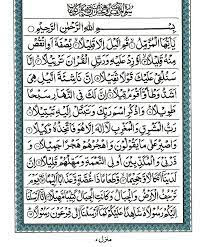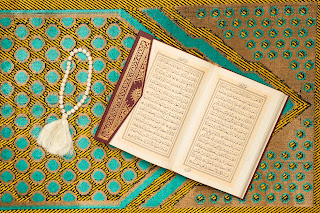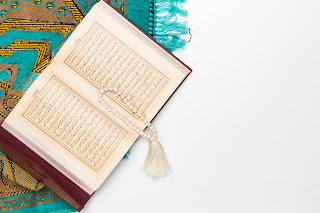English Translation and Tafsir of Surah Al-Muddathir Ayah 11-30
74:11 Leave Me with him whom I created alone,
74:12 and gave him ample wealth,
74:13 and sons by his side,
74:14 and made all things smooth for him.
74:15 Then, he desires that I should give more.
74:16 No! Truly he has been stubbornly against Our signs.
74:17 I shall make him endure a hard ascent.
74:18 Surely, he thought and determined --
74:19 Woe to him! How he determined!
74:20 Then, woe to him! How he determined!
74:21 Then, he looked,
74:22 Then, he frowned and scowled.
74:23 Then, he turned back and waxed proud.
74:24 Then, he said, ‘This is nothing but magic from old times.
74:25 This is nothing but the word of a mortal.’
74:26 I shall burn him in Saqar!
74:27 And what will make you know what Saqar is?
74:28 It spares not nor does it leave.
74:29 It scorches the skin.
74:30 Over it are nineteen.
Relationship with the Previous Part
The previous part mentions that the Day of Judgment will be hard for the disbelievers. Then, one of the disbelievers, namely, Al-Walid Ibn Al-Mughirah, and his counterparts among the disbelievers are warned of the severe punishment of Allah if they insist on disbelieving in the Oneness of Allah and following the path of misguidance. It also mentions some of the blessings of Allah on Al-Walid Ibn Al-Mughirah, for which he should thank Allah and believe in His Oneness, but he was ungrateful and disbelieved in the Oneness of Allah.
Tafsir
74:11 Leave Me with him whom I created alone,
74:12 and gave him ample wealth,
It was reported that these ayat were revealed about Al-Walid Ibn Al-Mughirah.
O noble Messenger Muhammad, ‘Leave Me with him whom I created alone in his mother’s whom without having wealth nor children. I shall suffice you. I shall deal with him and take revenge on him. I have given him ample wealth, but he has denied My blessings on him instead of thanking Me and believing in My Oneness.’
The word ‘leave’ in the ayah is for warning and threatening.
It was narrated that Al-Walid Ibn Al-Mughirah was one of the wealthiest people in Makkah. He had abundant wealth of camels, sheep, slaves, orchards, etc.
74:13 and sons by his side,
74:14 and made all things smooth for him.
O noble Messenger Muhammad, ‘Leave Me with the disbeliever, Al-Walid Ibn Al-Mughirah, to whom I have given abundant wealth and sons, who are always by his side. They do not leave him to seek sustenance or travel for business because they do not need to work since their father is wealthy. I have also made all things smooth for him. I have made all means of comfort available for him so that he does not need to dispute with his people. This has made him powerful among his people and his opinion is greatly valued.’
In sum, Allah, Exalted be Him, gave Al-Walid Ibn Al-Mughirah all that man needs to live a comfortable life. He gave him abundant wealth, many sons, and effortless superiority and power.
74:15 Then, he desires that I should give more.
The ayah reveals the ingratitude and greediness that are inherent in this person’s personality. Though Allah, Exalted be He, has given him ample abundant blessings, he is never satisfied. Rather, he wants more and more because of his greediness. Indeed, his condition is strange.
74:16 No! Truly, he has been stubbornly against Our signs.
No! This disbeliever will surely be a loser. He will never have what he wants and hopes to acquire because he is stubbornly against the signs of Allah that confirm His Oneness and perfect ability, and he denies them. He strongly opposes the Messenger of Allah and accuses him of magic though he knows that he is truthful.
74:17 I shall make him endure a hard ascent.
Allah will make this disbeliever endure a hard ascent. He will make him suffer severe and lasting punishment. The severity of his punishment will be like the difficulty that one endures when he ascents a very high mountain or carries a very heavy object.
It was said that the hard ascent means a mountain in Hell, which the dwellers of Hell will be asked to ascend. Abu Sa’id Al-Khudri, may Allah be pleased with him, said, ‘[74:17 I shall make him endure a hard ascent.] Messenger Muhammad [peace be upon him] said, ‘It is a mountain in Hell, which is made of fire and the dwellers of Hell be asked to ascend it. When he puts his hand on it, it will melt, and when he lifts it, it will return to its normal condition. And when he puts his foot, it will happen to it the same thing.’
74:18 Surely, he thought and determined --
74:19 Woe to him! How he determined!
74:20 Then, woe to him! How he determined!
Ikrimah narrated, ‘Al-Walid Ibn Al-Mughirah went to Messenger Muhammad, who recited the Quran to him. It was as if Al-Walid was touched by the Quran. His reaction reached Abu Jahl’s ears. Then, Abu Jahl went to Al-Walid and said, ‘Dear uncle, your people want to collect money for you. Al-Walid said, ‘Why?’ Abu Jahl said, ‘They want to give it to you because you went to Muhammad, seeking some wealth from him.’ Al-Walid said, ‘Indeed, Quraysh knows that I am the wealthiest man among them.’ Abu Jahl said, ‘Thus, you should say something about Muhammad to make your people believe that you disapprove of what he has brought and that you hate it.’ Then, Al-Walid said, ‘What shall I say about the Quran? By Allah, no man among you knows poetry more than me, nor knows rajaz more than me, nor poem more than me, nor the poetry of the jinn more than me. By Allah, what Muhammad says is never similar to anything of these things. By Allah, his speech has sweetness, it will wipe up whatever thing that is below it, and it will dominate and cannot be dominated.’ Abu Jahl said, ‘By Allah, your people will never be satisfied until you say something against it.’ Then, Al-Walid said, ‘Leave me a while so that I can think about something against it.’ Then, Al-Walid thought and said, ‘This is magic that Muhammad was taught by someone.’ Therefore, Allah revealed, [74:11 Leave Me with him whom I created alone,]
74:18 Surely, he thought and determined --
74:19 Woe to him! How he determined!
74:20 Then, woe to him! How he determined!
Al-Walid Ibn Al-Mughirah determinedly thought about what to say about Messenger Muhammad [peace be upon him] and the Quran. He thought to fabricate something against Messenger Muhammad [peace be upon him] and the Quran. Woe to him! How he determined! Then, woe to him! May he be cursed and punished for what he determined!
74:21 Then, he looked,
74:22 Then, he frowned and scowled.
74:23 Then, he turned back and waxed proud.
The ayat eloquently portray the condition and reaction of Al-Walid Ibn Al-Mughirah. They describe his body movement, his heart’s emotions, and his facial reactions.
Al-Walid Ibn Al-Mughirah determinedly thought about what to say about Messenger Muhammad [peace be upon him] and the Quran. Then, he looked at the faces of those who were around him, pretending to be seriously thinking about the matter. He acted as if he wanted to say to them, ‘Listen carefully to what I will say about this matter.’ Then, he frowned and scowled. His face color changed and his extremities trembled when he was unable to find any defect in the Quran.
74:23 Then, he turned back and waxed proud.
After deep thought and reflection and after frowning and scowling, Al-Walid Ibn Al-Mughirah turned back and waxed proud. He arrogantly turned away from the truth and proudly rejected following it.
74:24 Then, he said, ‘This is nothing but magic from old times.
74:25 This is nothing but the word of a mortal.’
Conceitedly and Denyingly, Al-Walid Ibn Al-Mughirah said, ‘This Quran that Muhammad claims that God has revealed to him is nothing but magic from old times. Muhammad reports it from the stories of the ancients. This Quran is nothing but the word of a mortal and not the speech of God as Muhammad claims.’
The statement of Al-Walid Ibn Al-Mughirah about Messenger Muhammad and the Quran is evidence that he contradicted himself as he believed that Messenger Muhammad was truthful, but he disbelieved in him and the Quran out of stubbornness and arrogance.
74:26 I shall burn him in Saqar!
74:27 And what will make you know what Saqar is?
74:28 It spares not nor does it leave.
74:29 It scorches the skin.
74:30 Over it are nineteen.
Allah, Exalted be He, mentions the severe punishment that He has prepared for Al-Walid Ibn Al-Mughirah.
Allah, Exalted be He, will burn him in Saqar, namely, Hell. And what will make you know what Saqar is? No one can know exactly how severe its punishment is. It spares not nor does it leave any of the flesh or the bones of dwellers of Hell. And they will be returned to their former state, but Hell will re-burn them again, and so on. In addition, Hell scorches the skin and makes it black and it causes severe pain to its dwellers. Hell has nineteen keepers over it. They are responsible for punishing its dwellers and they carry out the commands of Allah concerning them.
Qatada, said, ‘When this ayah was revealed [74:30 Over it are nineteen.], abu Jahl said, ‘O people of Quraysh! Cannot every ten persons among you defeat one of the keepers of Hell as you are the strongest men? Your companion, namely, Messenger Muhammad, has claimed that it has nineteen keepers over it.’
Learned Lessons from Surah Al-Muddathir Ayah 11-30
• Wealth, children, and prestige are causes of tyranny except when Allah protects one from their temptation.
• The stubborn people who disbelieve in the signs confirming the Oneness of Allah and turn others away from the path of Allah are the greatest disbelievers.
• Al-Ibn Al-Mughirah deserves severe punishment because he disbelieved in the Oneness of Allah, His Messenger, and the Quran, as well as he claimed that the Quran was magic.
• Reflection that turns away from divine guidance, no matter how deep it may be, leads to destruction and loss.
• Repeated reflection on the truth makes it clearer, on the other hand, reflection on falsehood makes it weaker for those who have sound dispositions and sincerely seek the guidance of Allah.
• Allah sent His revelation to His Prophet and Messenger Muhammad.
• The Day of Judgment will certainly take place.







